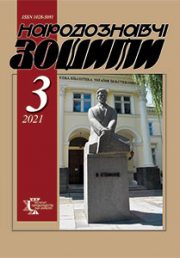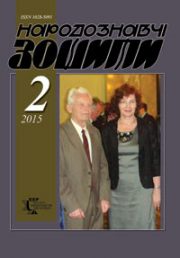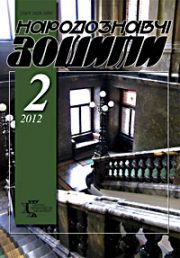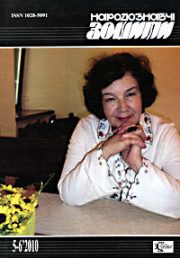The Ethnology Notebooks. 2018, 3 (141), 719–725
UDK 792.82:78.085.5(477)”1950/1999″
DOI https://doi.org/10.15407/nz2018.03.719
Khotsianovska Liudmila Frantsivna, associate professor
of folk and classical choreography department KNUKiM,
Honored Artist of Ukraine.
Ye. Konovaltsia Street 36, 01601, Kyiv, Ukraine.
Contacts: Tel. (097)-903-27-67, e-mail: khotsya@ukr.net
Abstrakt. In article the attempt of the system analysis of data on ballet music of the Ukrainian composers in the second half of the XX century is made. Neoclassical and postmodern concepts of development of the ballet during the second half of the last century are considered. Theoretical justification of indissoluble connection of music with dance in the ballet is carried out. It is proved that organic synthesis of music and choreography in the ballet becomes possible thanks to connection of the figurative nature of these arts. Works of such Ukrainian composers of ballet music as M. Verykovskyi, M. Skorulskyi, K. Dankevych, V. Homoliaka, A. Kos-Anatolskyi, E. Stankovic are investigated. It is proved that during the second half of the 20th century the musical conglomerate of composers who were involved in formation of the contemporary art history of the ballet was created. Personal character (identity), sensuality, refinement and emotional complexity became characteristics of their creativity. Ukrainian composers has managed to connect skillfully in the music classics and the present, to enrich ballet compositions with energy of free plasticity and an esthetics. As music of composers is closely connected with the Ukrainian folklore, so to their works inherent heroic pathos, lyricism, brightness and an emotional spontaneity and also combination of the distinguished equipment and the detailed polyphonic invoice with melodious lyricism and an expression. It is specified that in the second half of the XX century in Ukraine such form of theater as the national and heroic drama which was characterized by bright national coloring, epic dramatic art and also combination of musical and choreographic folklore is formed. A connection of symphonic numbers from richly orchestrated and inventively arranged quotes from the Ukrainian national songs was typical for music. In general the understanding of national character, melodious plasticity, bright figurativeness, feeling of poetic intonation and original style are inherent in the national and heroic drama. Combination of heroic pages of the Ukrainian history with the present is inherent in a number of works. Many Ukrainian composers in search of folklore motives for the works addressed musical inheritance of the most original and archaic historical and geographical regions of our country, in particular Prykarpattia.
Keywords: ballet, ballet music, choreography, choreographic art, dramatic art, composer, art, dance, scenario, dansology, history, classics, postmodern, eclecticism.
Received 21.02.2018
References
Baitalska, S.S. (2009). Muzychne vykhovannia ta osnovy khoreohrafii z metodykoiu vykladannia. Lutsk: Vezha [in Ukrainian].
Davydova, O. Mykhailo Verykivskyi: stanovlennia tvorchoi osobystosti (1923—1941 roky). Naukovyi visnyk Natsionalnoi muzychnoi akademii Ukrainy imeni P.I. Chaikovskoho: Kompozytory i muzykoznavtsi Kyivskoi konservatorii u 1923—1941 rokakh. Issue. 113, 100—108 [in Ukrainian].
Zavialova, O.K. (2014). Istoriia baletnoho mystetstva: vid vytokiv — do pochatku XX st. Sumy: Mriia [in Ukrainian].
Zahaikevych, M.P. (1978). Dramaturhiia baletu. Kyiv: Naukova dumka [in Ukrainian].
Zahaikevych, M.P. (2009). Mykola Hohol i baletna tvorchist ukrainskykh kompozytoriv. Studii mystetstvoznavchi: Teatr. Muzyka. Kino, 4, 68—73 [in Ukrainian].
Mukha, A.I… (eds.). (2004). Istoriia ukrainskoi muzyky, 1941—1958 rr. (Vol. 5). Kyiv: NAN Ukrainy; IMFE im. M. Rylskoho [in Ukrainian].
Kovalenko, Ye. (2014). Balet «Lileia» K. Dankevycha yak vzirets khoreohrafichnoi interpretatsii Shevchenkovoi tvorchosti. Kulturolohichna dumka: Shchorichnyk nauk. prats, 7, 19—27. Kyiv: Instytut kulturolohii Natsionalnoi akademii mystetstv Ukrainy [in Ukrainian].
Stanishevskyi, Yu.O. (2003). Baletnyi teatr Ukrainy: 225 r. istorii. Kyiv: Muzychna Ukraina [in Ukrainian].
Stanishevskyi, Yu.O. (2002). Natsionalna opera Ukrainy. Kyiv: Muzychna Ukraina [in Ukrainian].
Fryz, P.I. (2008). Mystetstvo baletmeistera. Drohobych: Drohobytskyi derzh. pedahohichnyi un-t im. Ivana Franka [in Ukrainian].
Chekan, Yu. I. Yevhen Stankovych: try shtrykhy do portreta. In Z istorii Kyivskoi konservatorii — NMAU im. P.I. Chaikovskoho. Do 100-richchia NMAU im. P.I. Chaikovskoho, (pp. 153—161) [in Ukrainian].
Chepalov, O.I. (2007). Khoreohrafichnyi teatr Zakhidnoi Yevropy XX st. Kharkiv: XDAK [in Ukrainian].
Shabalina, O.M. (2010). Vid tantsiu ekspresyvnoho do tantsiu intelektualnoho. Visnyk Kharkivskoi derzhavnoi akademii dyzainu i mystetstv. Mystetstvoznavstvo. Arkhytektura, 1, 242—246 [in Ukrainian].
Sharykov, D.I. (2008). Klasyfikatsiia suchasnoi khoreohrafii: napriamy, styli, vydy. Kyiv: Vydavets Vadym Karpenko [in Ukrainian].
Borys, Ejfman: Ya propoviduiu total’nyj teatr. Retrieved from: www/ ria.ru/interview.
Karmazin, A. Mihail Verikovskij — novyj kontekst. Retrieved from: day.kyiv.ua.







